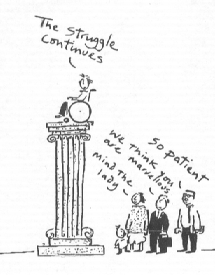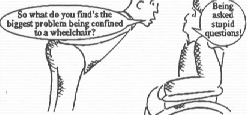Labels: A Liability of DisabilityAn article by Mike Squire in the MD Group Newsletter, Summer 1994 |
|
'Sticks and stones will break my bones but words will never hurt me.' "But they do hurt me!" says Mike Squire. Mike has SMA and knows all to well how disabled people are neatly packaged up into an amorphous mass called 'the disabled' and despatched with some irritatingly inaccurate and damaging labels.
Language and terminology are of paramount importance to discriminated groups involved in eliminating racism and sexism, and the same is true for disability. I and many organisations such as the British Council of Organisations of Disabled People (BCODP) place a high value on the language and images that are used to portray and communicate with disabled people. Words used thoughtlessly send out the wrong images and meaning. They hurt my own feelings and perpetuate the received ideas that thet the world at large seems to have about disabled people.
Nearly every week I get some praise of "How well you've done" or "It's amazing what you can achieve ... considering ...". The fact is I've never been asked to wear my underpants on the outside of my wheelchair and audition for the role of Superman. If I have done well in life it's not because I'm special, magical or super-human, it's just that I'm on this planet to live – and that's what I'm doing. The only magical thing I've ever done was when I drank a bottle and a half of whisky one night and didn't wake up with a hangover. Lumping a diverse group of people together as 'the disabled' defines people solely by their disability and discards all sense of identity. Yes, I have SMA but I am Mike Squire, a person first and foremost and my impairment is simply one part of me; I am a disabled person. Incidentally, disabled is the most commonly used word to describe me but I'm not disabled because bits of my body don't work, I'm disabled because society puts up social and physical barriers. Short-sighted people would be disabled if spectacles had not been invented. Although wheelchairs have been invented I still can't get up steps or use a bus. I do not have a disease, I have not got an illness except for the summer 'flu which is plaguing me at the moment. I do not suffer from having SMA, in fact it's rather a pleasant experience, nor am I invalid (in-valid). Until recently Buckingham Palace still had Invalid Toilets – presumably these were the toilets without Royal Appointment. Now, I like the word 'impairment'. I am impaired in that obviously my arms are not as strong as they should be, and my mouth moves too much. These are the impairments which make up the Mike Squire everyone knows, they always will be and that's how I'll be remembered – so tough.
There's a lot more to say on this subject, but the important principle to keep in mind is that labels can be disabling, and that language is important, in fact using the correct words and sending out the correct messages is vital. I don't suggest that it's easy to use the appropriate words, but if you're unsure, ask a disabled person. It's just the same as when you're on holiday abroad and you ask someone what the right words are to order a whisky. Alas, you could always ask me. |
| "The struggle continues" by Angela Martin "What do you find's the biggest problem . . ." by Paul Minett, 1994 |
| [ Back to Mike's index page ] |
 Take the triumph-over-tragedy syndrome: Words such as "courageous", "brave" and "plucky" attempt to show how wonderful I can be. To me wandering around using my wheelchair is not brave, though crossing a road with a dropped pavement on one side only could be. I think that the most courageous thing I've ever done is hold a tarantula – not exactly linked to my disability – but it did make me sweat.
Take the triumph-over-tragedy syndrome: Words such as "courageous", "brave" and "plucky" attempt to show how wonderful I can be. To me wandering around using my wheelchair is not brave, though crossing a road with a dropped pavement on one side only could be. I think that the most courageous thing I've ever done is hold a tarantula – not exactly linked to my disability – but it did make me sweat. I'm certainly not bound or confined to my wheelchair. Could you imagine saying "I'm confined to my spectacles", or "I am bound to my crutches"? I use my wheelchair. 'Confined' conjures up an image of being stuck, immobile in my chair yet I use it to get around and about just as I would a car or a good pair of shoes. The only 'bound' I am at the moment is homeward bound because I've not seen my family for a while. Oh, and I'm bound to be overdrawn again when I get back from my holidays.
I'm certainly not bound or confined to my wheelchair. Could you imagine saying "I'm confined to my spectacles", or "I am bound to my crutches"? I use my wheelchair. 'Confined' conjures up an image of being stuck, immobile in my chair yet I use it to get around and about just as I would a car or a good pair of shoes. The only 'bound' I am at the moment is homeward bound because I've not seen my family for a while. Oh, and I'm bound to be overdrawn again when I get back from my holidays.